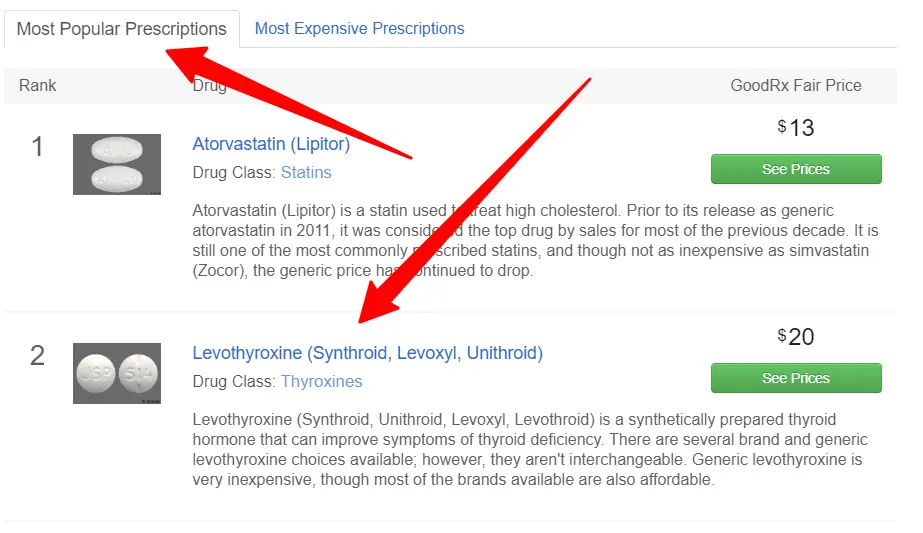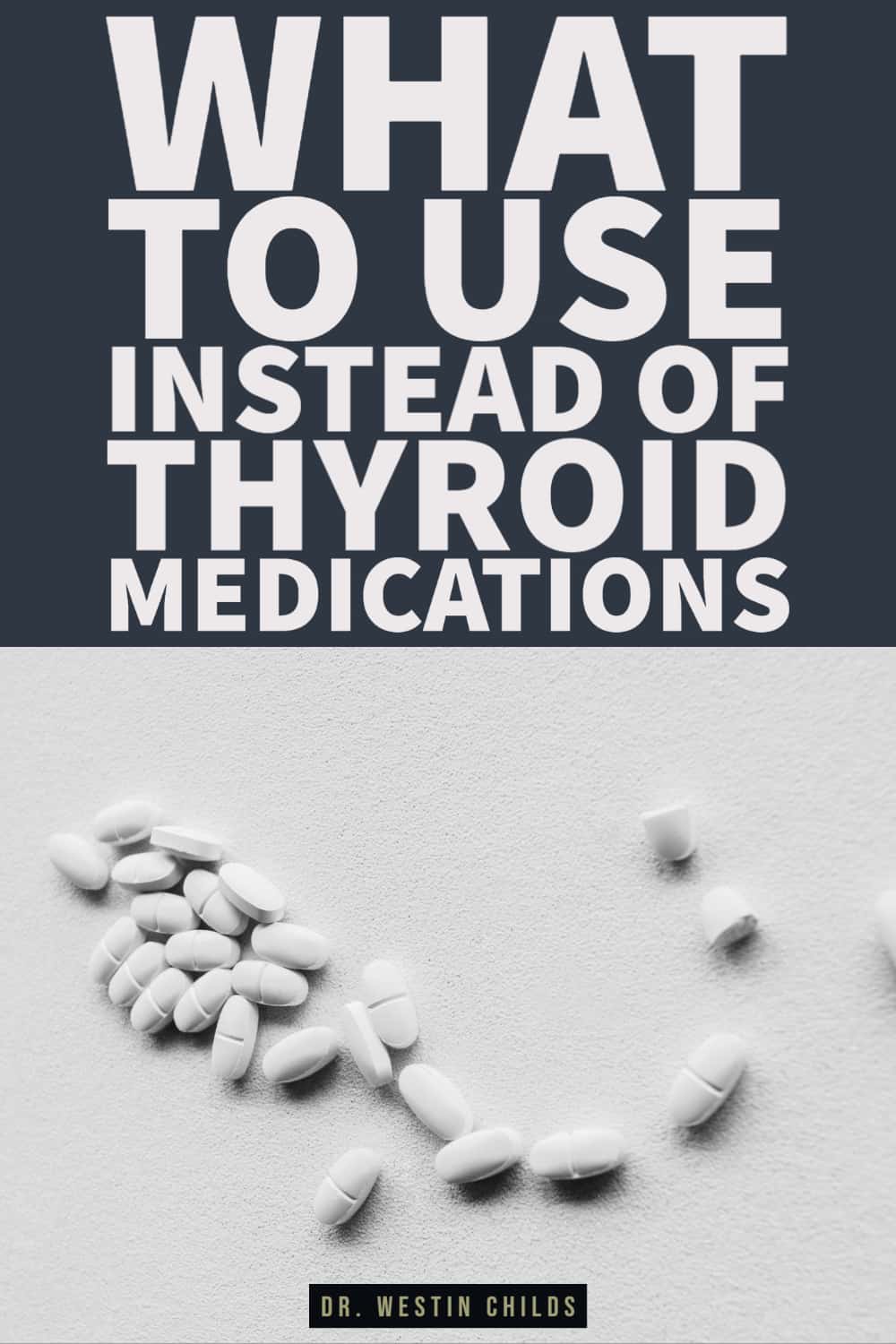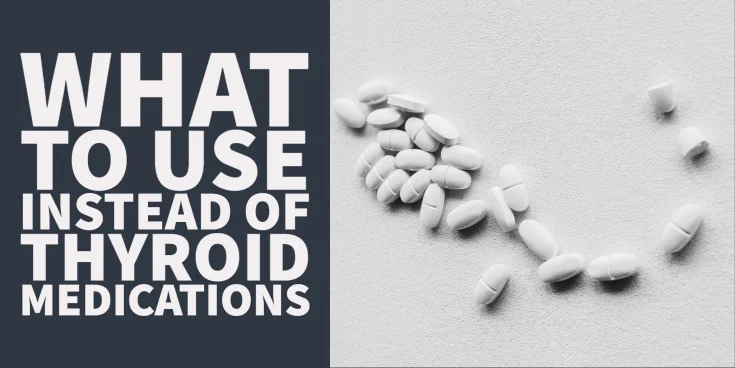Is it possible to use something other than the standard thyroid meds that you’ve been given by your doctor?
The answer is maybe.
But I don’t want you to think that it’s always possible to get off of your thyroid medication because that just isn’t the case.
If you are someone with REALLY advanced Hashimoto’s thyroiditis, someone who has had their thyroid completely destroyed with RAI, or even someone who has had their thyroid completely removed surgically then you will need to be on thyroid medication for the rest of your life.
But what about all of the others?
Are there any other alternatives available to them?
That’s exactly what we are going to go over today.
The short answer is yes, there are certainly some options available.
I’ve discussed in detail in other articles how to determine if you are one of the people that can potentially get off of thyroid medication so I would recommend you read that post if you haven’t already.
Today we are going to focus on the therapies that YOU can use that can help your thyroid do the job it was supposed to do:
Create thyroid hormone.
If you can find a way to naturally improve this function then you can either completely get off of the thyroid meds that you are using OR you can potentially reduce the dose that you are taking (which is also a good thing).
But, before you go ahead and jump into this, you should be aware that getting off of your thyroid medication (while possible in some cases) is not without risks.
Using thyroid medication (of any type) creates a dependence in your body and it takes time for the body to return to its normal state once stop (if it’s capable of it).
So use caution when doing this! I would prefer you do it with the help of your doctor but most doctors may not be on board due to a lack of knowledge.
DOWNLOAD FREE RESOURCES
Foods to Avoid if you Have Thyroid Problems:
I’ve found that these 10 foods cause the most problems for thyroid patients. Learn which foods you should avoid if you have thyroid disease of any type.
The Complete List of Thyroid Lab tests:
The list includes optimal ranges, normal ranges, and the complete list of tests you need to diagnose and manage thyroid disease correctly!
Alternatives to Using Synthroid & levothyroxine
We are going to focus primarily on therapies that can be used INSTEAD of both Synthroid and levothyroxine which about 90% (or more) of thyroid patients are taking.
These thyroid meds are among the most PRESCRIBED in the entire United States (1) which indicates to me that a great many people take these medications.

The good news is that there are other options that can help!
The list below includes these therapies (in no particular order) and they are all therapies that I have used in my own personal practice to help thyroid patients.
#1. Thyroid Glandulars
The first on the list is something referred to as Thyroid Glandulars.
Thyroid glandulars are over-the-counter supplements that literally contain crushed portions of animal thyroid glands.
Animals, especially pigs and cows (porcine and bovine-derived sources), have thyroid glands that have the SAME thyroid hormones that humans use (but in slightly different ratios).
Once the animal passes away, it’s possible to take their thyroid glands and process and desiccate them in such a way that they can be used in over-the-counter supplements.
Why would you want to do this?
Because the thyroid gland itself contains enzymes, proteins, hormones, and precursors that your OWN thyroid gland contains!
These ingredients, if taken by mouth, can then be used as a therapeutic agent to help your OWN thyroid gland work.
We don’t actually know how exactly they work (from a scientific point of view) because there aren’t many studies being pumped out by pharmaceutical companies on the topic.
But we do know from patient experiences and from expert opinions (doctors who have used them before) that they can indeed work for certain patients.
We also know that these supplements are SAFE! Well, I should say that they are safe if created and formulated in the proper way to determine that there are no pathogens or bacteria in the ingredients.
In addition, because it would be illegal, the thyroid glandulars can be stripped of any active thyroid hormones before they are processed into supplement form.
This means that you are getting all of the enzymes, proteins, and other ingredients WITHOUT the added thyroid hormones (and this is exactly what you want).
You do NOT want to find supplements that contain thyroid hormone because it can be dangerous if they are not dosed or used properly.
As I mentioned previously, it isn’t exactly known how or why thyroid glandulars work but my suspicion is that they are providing your body with enzymes and proteins that the thyroid needs to work that we probably don’t have a complete understanding of.
They may also work to help reduce inflammation and heal the thyroid gland similar to the way that stem cells would work.
But this is my own speculation and isn’t backed by any research or studies.
#2. Adrenal Glandulars
Next on the list would be adrenal glandulars.
Adrenal glandulars are similar in how they work and what they contain to thyroid glandulars.
The only difference is that adrenal glandulars come from the adrenal gland of animals instead of the thyroid gland.
Why do we care about adrenal glands when we are talking about thyroid meds?
The reason is simple:
There is a huge connection between your adrenal gland and your thyroid gland.
This connection is so strong that if one of these hormone systems goes down it will take the other with it.
This is why so many thyroid patients suffer from adrenal fatigue and it’s also why people with adrenal fatigue can suffer from hypothyroid symptoms.

In addition, there is also a lot of overlap between the symptoms of adrenal fatigue and the symptoms of hypothyroidism.
Symptoms like weight gain, fatigue, changes in blood sugar, brain fog, and depression can occur in BOTH states.
We care about this because treating your adrenals is a way to indirectly (or directly, depending on how you think about it) treat your thyroid gland.
I have seen really good results in thyroid patients using adrenal glandulars which is evidenced by the fact that my number-selling thyroid supplement contains adrenal glandulars.
If you have thyroid disease, pretty much of any type, then you should treat your adrenal glands with either adrenal glandulars or adrenal adaptogens.
When it comes to trying to get off of thyroid meds I do think that adrenal glandulars are more powerful and more effective but both have the potential to work.
#3. Iodine
Another incredibly useful tool for treating the thyroid gland is the use of iodine.
Many thyroid patients are actually scared to use iodine because they’ve heard from someone or some source that it’s dangerous.
And while there may be some truth to these claims, the idea that an essential and required nutrient in your body is dangerous is largely overblown.
If you avoid iodine as a thyroid patient (even those with Hashimoto’s), you actually run the risk of making your thyroid worse.
So we can use this as an advantage if you are trying to get off of thyroid meds considering that MANY thyroid patients are deficient in iodine.
How does iodine help?
Iodine is an essential and critical nutrient that is required to CREATE thyroid hormone in the thyroid gland.
Iodine forms the backbone of thyroid hormone (both T4 and T3) and dictates if that thyroid hormone will be functional.
Low levels of iodine results in decreased thyroid hormone production and, therefore, hypothyroidism or low thyroid function.
How much iodine you should be taking is a different story entirely.
If you are trying to use iodine to get off of your thyroid meds then you would want to use a different dose than someone who is okay staying on their thyroid medications or who just wants it for a “daily” dose.
People who are trying to get off of their thyroid meds will need a larger or higher dose of iodine (much higher compared to the RDA).
In addition, you will ALSO want to use certain nutrients such as Zinc, Selenium, Vitamin E, and Vitamin A to try and help improve thyroid cellular sensitivity.
The dose of iodine you’ll want to use to naturally improve your thyroid is somewhere in the range of 6mg to 12.5mg per DAY.
You can compare this dose to the “standard” RDA which is about 150 to 270 MCG per day.
Note that this is in MICROGRAMS and not MILLIGRAMS like the higher dose listed above.
High doses of iodine do carry a slightly increased risk of side effects, though, such as detoxification-like reactions (acne) (1), and rarely they can cause thyroid inflammation if you are also selenium deficient (2).
These side effects may be worth the risk, however, if it means that you can ultimately reduce or get off of your thyroid meds in the future.
#4. Essential Oils
Another potential option is the use of essential oils to naturally treat your thyroid.
I’ve never been a huge fan of essential oils in the setting of reversing thyroid disease (I just think there are better options available) but recently I’ve started to shift my thinking on them.
I find the best way to use them is in conjunction with the other therapies that you see listed here.
While it may be possible to use some therapies such as adrenal glandulars or adrenal glandulars by themselves, I don’t think you should take this approach with essential oils.
It would be far better to use them WITH adrenal glandulars or WITH thyroid glandulars.
In terms of their efficacy, I find that they are probably one of the weaker therapies listed in this article (probably the weakest now that I say that).
It doesn’t mean that they can’t be used or that they aren’t effective but our main goal here is to try and get OFF of your thyroid meds.
And to do that we have to use strong therapies.
Essential oils in the setting of treating your thyroid are best used to indirectly treat the thyroid by either reducing inflammation, promoting cellular repair, reducing thyroid antibodies, or improving your tolerance and resilience to stress.
These are the essential oils that you would want to use:
- Spearmint – Spearmint may help reduce sex hormone levels and balance testosterone/androgens (3).
- Lemongrass – Lemongrass has been shown to have anti-inflammatory benefits (4) and may help treat inflammatory conditions such as Hashimoto’s.
- Peppermint – Peppermint aromatherapy may help increase exercise tolerance (5)and promote improved respiratory function (breathing).
- Frankincense – Frankincense has been shown to have anti-inflammatory, expectorant, antiseptic, anxiolytic (anti-anxiety), and anti-neurotic effects (6).
- Myrrh – Myrrh is another potent inhibitor of inflammation (7).
- Cedarwood
- Rose geranium
#5. Natural Desiccated Thyroid Gland (NDT)
Finally, we have the option of using Natural Desiccated Thyroid.
I know this is an article about how to get OFF of thyroid meds and here I am talking about another thyroid medication but it’s my list so I am going to tell you about it 🙂
Natural Desiccated Thyroid doesn’t really fit the bill of thyroid medications simply because most doctors are NOT willing to prescribe it or let patients use it.
So even though it is technically a thyroid medication that requires a doctor’s prescription, it’s still different from levothyroxine and Synthroid in that it is sourced from an animal (much like thyroid glandulars).
In fact, you can think of Natural Desiccated Thyroid (or NDT for short) as basically the same thing as thyroid glandulars but the only difference is that the hormones are kept IN during formulation.
Remember:
Thyroid glandulars contain thyroid gland materials MINUS thyroid hormones whereas NDT contains thyroid gland material PLUS thyroid hormones (T4 + T3 + T2 and even calcitonin).
The reason that these can be included in NDT and not in thyroid glandulars is that the FDA ensures that the companies creating NDT maintain standards and consistency in each batch of NDT produced.
They ensure that each grain of NDT contains the exact same amount of hormones (8) (both T4 and T3) so that doctors can reliably prescribe these medications to patients across the United States.
Unfortunately, most doctors fail to realize that this occurs and some even make the erroneous claim that NDT is not standardized and it doesn’t contain consistent concentrations of thyroid hormone.
This is simply false and the FDA wouldn’t let them operate if that were the case.
In addition, we also have third-party tests confirming the T4 and T3 concentrations of each batch to ensure that they are standardized.
Why would you want to use NDT over Synthroid and levothyroxine?
I think the main reason is that they are considered a more natural source of thyroid hormone in that they are not produced in a lab (they are not synthetic in that sense).
Another reason and this one is huge, is that NDT contains the additional enzymes, proteins, and hormones that are found in animal glands (much like what would be found in human thyroid glands).
So you are getting all of the benefits of thyroid glandulars PLUS the added bonus of T4 and T3 PLUS the added bonus that NDT is more natural in its origins than levothyroxine/Synthroid.
This makes NDT very appealing to many patients.
My recommendation is to try and get on NDT if you find that the other natural therapies listed above don’t work to help you get off of your thyroid meds completely.
At least at that point, you can honestly say that you gave it your best shot and you can transition to a prescription thyroid med which is more natural and contains added ingredients.
This isn’t to say that NDT is completely free of problems, I don’t want you to believe that.
All thyroid medications have their pros and cons.
But I do believe that NDT offers certain benefits that you don’t find in levothyroxine and Synthroid which may be part of the reason that so many patients prefer these medications.
Final Thoughts
So there you have it.
At least 5 different alternatives to thyroid meds that you can potentially start using right away (with the exception of NDT).
And while ALL of these things have the potential to help you get off your thyroid meds (or at least reduce your dose), I want you to also be aware that you can combine them with your current thyroid medications.
So, even if you try one of these options and you don’t see amazing results, you can still use them in conjunction with your Synthroid or levothyroxine.
You should also be aware that not all of these therapies may work for you! But that doesn’t mean that they are useless or shouldn’t be considered.
Remember:
Each of you is unique and will require different therapies in order to feel 100%.
Don’t be discouraged if you try one or more of these therapies and don’t see the results that you want.
Continue to try various things until you find what works for YOU (this may take some trial and error!).
But now I want to hear from you:
Have you tried any of these alternatives?
If so, how did it work out for you?
Were you able to reduce your thyroid meds or completely stop using them?
Have you tried other therapies? If so, please share what worked for you and what didn’t!
The best thing we can do is to keep the conversation going! Please leave your questions or comments below.
Scientific References
#1. https://emedicine.medscape.com/article/1090031-treatment
#2. https://www.ncbi.nlm.nih.gov/pubmed/19594417
#3. https://www.ncbi.nlm.nih.gov/pmc/articles/PMC5788221/
#4. https://www.ncbi.nlm.nih.gov/pmc/articles/PMC5801909/
#5. https://www.ncbi.nlm.nih.gov/pmc/articles/PMC3607906/
#6. https://www.ncbi.nlm.nih.gov/pubmed/27117114
#7. https://www.ncbi.nlm.nih.gov/pmc/articles/PMC4556964/
#8. https://media.allergan.com/actavis/actavis/media/allergan-pdf-documents/product-prescribing/06-2018-Armour-Thyroid-PI-final.pdf








